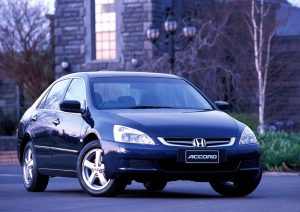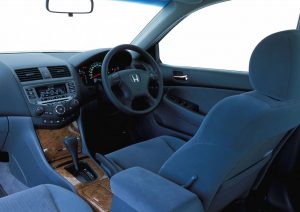Recalls: Honda CM5/CM6 Accord
Overview
Manufacturers, or importers, issue recalls for defects or faults which have the potential to cause injury. Generally, manufacturers will inform the original buyers if their vehicle is subject to a recall and of the steps required to remedy the defect or fault. Please note that the number of recalls should not be taken as an indicator of a model’s reliability or its safety more generally.
Recalls: Honda CM5/CM6 Accord
2003-04 Honda CM5/CM6 Accord: loss of fuel pressure
In July 2004, a recall was issued for the 2003 and 2004 Honda Accord due to the potential for high ambient temperature and severe driving conditions to produce vibrations which cause the fuel pressure regulator valve clip to malfunction; this could cause a loss of fuel pressure to the engine (PRA 2004/7101).
2005 Honda CM5/CM6 Accord: engine may stall and not restart
In March 2007, a recall was issued for 2005 Honda Accord models due to potential contamination of the fuel pump relay coil which could fatigue and burnout due to repeated flexion by heat expansion and shrinkage – this could cause the engine to stall and not restart (PRA 2007/9129).
2004-07 model year Honda CM5 Accord: Takata airbag recall #1
In June 2015, a recall was issued for 2004-07 model year Honda CM5 Accord vehicles and this recall was updated with new information in September 2017. In these vehicles, the driver’s airbag contained propellant wafers that could absorb moisture over time. In the event of deployment, the airbag inflator housing could therefore rupture and cause metal fragments to be projected through the cabin – these posed a risk of serious injury and fatality to vehicle occupants. For the VINs of the recalled Honda Accord vehicles, please see PRA 2015/14737.
2003-07 model year Honda CM5/CM6 Accord: Takata airbag recall #2
In July 2016, a recall was issued for 2003 to 2007 model year Honda Accord vehicles and this recall was updated with new information in September 2017. In these vehicles, propellant wafers in the airbag inflators could absorb moisture over time and cause overly aggressive combustion if the airbag was deployed. This, in turn, would create excessive internal pressure that could cause the airbag inflator housing to rupture and scatter metal fragments through the airbag cushion material; these scattered fragments could cause serious and potentially fatal injuries to vehicle occupants. For the VINs of the recalled vehicles, please seePRA 2016/15495.
2003-07 Honda Mk.7 Accord: replacement of airbags fitted from 2015 to 2017
In April 2019, recall campaign 6KY was issued for 2003-07 Honda Accord vehicles that were fitted with a replacement airbag inflator between 1 March 2015 and 31 December 2017. These vehicles were fitted with ‘like for like’ replacement Takata airbags which contained propellant wafers that could absorb moisture over time. In the event of airbag deployment, excessive pressure in the airbag inflator housing could cause it to rupture and project metallic fragments into the vehicle’s cabin. These metallic fragments posed a risk of serious injury and death. For the VINs of the recalled vehicles, please see PRA 2019/17450.
2003-05 Honda CM5 Accord: replacement of ‘like for like’ Takata airbags
In August 2019, recall campaign 6DE was issued for Honda CM5 Accord vehicles that were available for sale from 18 March 2003 to 7 January 2005. These vehicles had their original Takata passenger airbag inflators replaced with a recently manufactured Takata inflator (‘like for like’). Since these replacement Takata inflators had the same fault – whereby propellant wafers could absorb moisture and airbag deployment could create excessive internal pressure that, in turn, could cause the airbag inflator housing to explode and disperse metallic fragments through the cabin – the inflators were to be replaced with non-Takata inflators. For the VINs of the recalled vehicles, please see PRA 2019/17659.
Search online for recalls by VIN
To see if a Honda vehicle has been recalled, you can conduct a search on the Honda Australia website using its VIN.
Problems and faults: Honda CM5/CM6 Accord
Overview
This section identifies potential problems, causes and fixes based on the experiences of owners and repairers, online sources and technical service bulletins. This information is provided solely for reference purposes and AustralianCar.Reviews recommends that only properly qualified persons carry out repairs or modifications. Furthermore, the number of items identified below should not be taken as an indicator of a model’s reliability or the frequency with which they may occur.
To report a problem or fault to the AustralianCar.Reviews team, please use the Contact Us form. Note that AustralianCar.Reviews does not offer advice on automotive problems or disputes; such enquiries will not receive a reply. For vehicles purchased from dealers after 1 January 2011, please see our Australian Consumer Law fact sheet.
Honda CM5 Accord: engine vibrates while idling
In May 2004, Honda USA issued service bulletin 04-024 for Honda CM5 Accord vehicles. In these vehicles, excessive vibration may be felt in the sat and steering wheel when the transmission was put in Drive or Reverse. The vibration may be worse in cold weather or with loads, such as with the air conditioning on or when the steering wheel is turned.
The service bulletin attributed the engine vibrations to a lack of engine dampening and recommended loosening and tightening the engine mounting bolts; an engine idle smoothing kit could also be fitted.
Honda CM5 Accord: MIL on with DTC P1172 or P2A00
In August 2007, Honda USA issued service bulletin 07-006 for 2006-07 Honda CM5 Accord vehicles. In these vehicles, the malfunction indicator lamp (MIL) may illuminate with the following diagnostic trouble codes (DTCs) –
- P1172: air fuel sensor (sensor 1) circuit out of range, high; and/or
- P2A00: air fuel sensor (sensor 1) circuit range/performance problem.
The service bulletin attributed this condition to the air/fuel sensor having been damaged by moisture in the exhaust system during engine warm-up. To fix,
- The ECM/PCM PGM-FI software was to be updated since it was revised to delay air/fuel sensor heater operation when there was a high probability of moisture on the air/fuel sensor; and,
- The air/fuel sensor replaced.
Problems and faults: Honda CM5/CM6 Accord
- For Honda Accords with the 3.0-litre V6 engine, the automatic tensioner for the timing belt could fail, resulting in excessive slack. Furthermore, a problem with the water pump casting could cause the timing belt to become misaligned.
- Vibrations from the steering wheel when braking may be caused by variations in the thickness of the brake rotors due to the type of brake pads used; revised brake pads were subsequently available to resolve this problem.
- The vehicle may drift from side to side due to uneven camber settings – it may be that this can only be corrected by relocating the engine cradle.
- The ‘check engine’ light may illuminate if the battery gets weak (i.e. has a low state of charge), requiring software updates to the powertrain control module.
- The ABS warning light may illuminate due to water entering the rear wheel speed sensor(s). If so, the sensors should be replaced.
- The airbag warning light may illuminate due to a defective occupant position detection sensor – if so, the sensor needs to be replaced. The airbag warning light may also come on if a laptop computer is used near the front passenger seat and should therefore be avoided.
- The air conditioner motor may overheat, blows its fuse and melt the fan if the cooling hose for the fan/blower becomes clogged.
- Where fitted, the sunroof may not close completely due to a defective limit switch which requires replacement.




